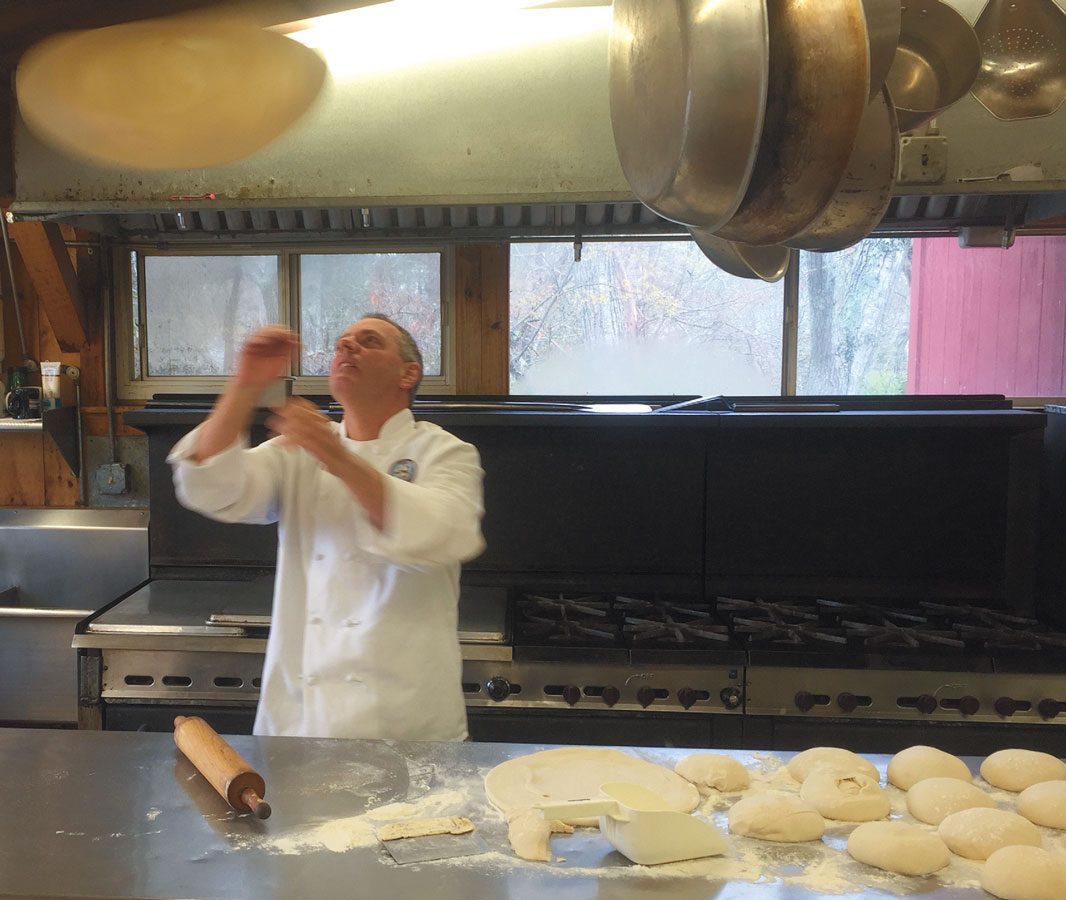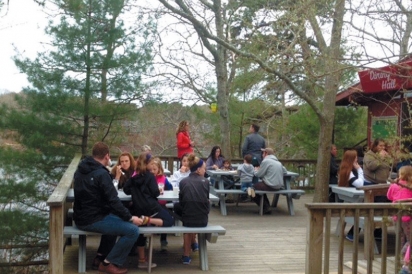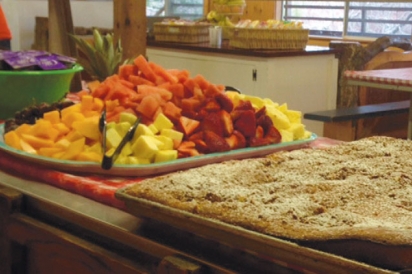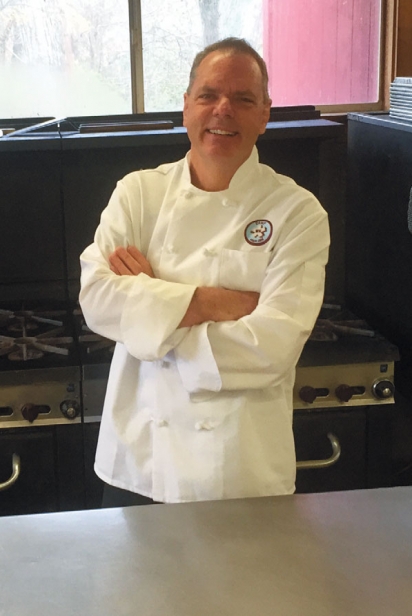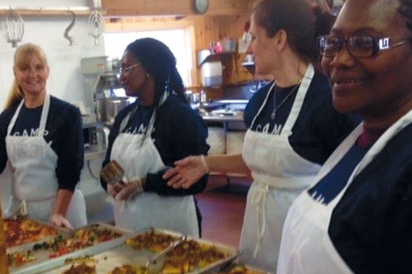The Transformation of a Chef
For many years, when he was a restaurant chef, Thomas Stark was at work long after the stars came out, well past the hour when many of us are putting our heads down for the night. Stark loved the vigor of that work—the creativity, the quick-on-your-feet speed, the kitchen camaraderie. He loved it, especially, that is, before he had children.
As his son Mario grew to school age, Stark began to feel a homeward pull. When his second son Elliot was born, the desire to be at home for dinner—to prepare dinner for his family, to be a part of putting his sons to bed—compelled him to consider how he could do the work that invigorated him, but in a setting that would have him home by day’s end.
Stark’s interest in cooking began when he was a small child sitting at his family’s dinner table. “Growing up in a family of seven, I always enjoyed the family connection that came from eating together in the evenings,” recalls Stark. His interest in becoming a chef came a little later. During the blizzard of 1978, he was a dishwasher in a Vermont restaurant. That evening, in the aftermath of the storm, the chef had a special dinner to prepare. Watching the chef do his job without missing a beat despite the bad weather and the lack of electricity lit a fire in Stark.
“Somehow, though most of the roads were closed, the biggest whole fish I’d ever seen was delivered from Boston. Twenty minutes later, the chef had prepared a pan of seared cod, lemon risotto, and asparagus, topped with tomato and fennel concasse. It was pure magic watching this chef—in such a short time and under difficult conditions—create a most amazing meal. That was the moment I knew I wanted to become a chef, and I’ve never looked back.”
After returning to his California home, Stark got his first cooking job at a fast food eatery, where he learned the essential restaurant skills of speed and efficiency. Later, after working as the executive chef at a steakhouse, Stark realized that in order to get ahead in his chosen profession he needed to further his education, so he enrolled in the California Culinary Academy. Following his schooling, he cooked for Hewlett Packard and worked as a chef for Sunset magazine. Wanting to shake things up, Stark moved to Italy where he got a job as the private chef for the American Consulate.
“One of the main things I like about being a chef,” Stark says, “is no matter how experienced you become, you’re always learning and looking to learn something new. Sometimes I get an idea just walking through a produce market or a farmers’ market where I can talk to the farmers themselves. As vast as the world is, so is the diversity of the world’s cuisines.”
Despite the world’s vastness, the east coast called Tom back again. He moved to Cape Cod where he had a bakery in Orleans and then in 1987 he started La Dough Main Bakery in Chatham. The New York Times featured Stark and his cranberry muffins in a cover story of their travel section. Ready to prepare main courses again, in 1995 he joined the staff at Brewster Fish House. It was Tom’s two young sons who, in 2010, led him to the most fulfilling work he’s ever had.
Chef Goes to Camp
Camp Wingate-Kirkland is a traditional, co-ed summer camp for children located in Yarmouth Port that opened in 1975. It offers a seven-week overnight camp and a ten-week day camp for children ages 7 through 15.
According to the camp’s co-owner, Sandy Rubenstein, “It’s a place where everyday kids can make their own choices and plan their own summer. We offer a safe place for children to try new things without feeling the social pressure of what’s cool and what’s not.”
Another thing that sets Camp Wingate-Kirkland apart is its attention to children who have food allergies. A number of years ago, Sandy and her husband co-owner Will, noticed that more and more campers were arriving with food sensitivities and allergies. Nowadays you won’t find a nut or a seed anywhere in the place.
Sandy says, “We didn’t like the attitude that if you have food allergies you have to go sit by yourself. The decision to not serve nuts was easy, but that first summer was a bit trying, like when the grandparents of a child with a severe peanut allergy mailed him Peanut M&M’s without recognizing the problem in doing so.”
Now campers and their families all understand they can’t bring nuts with them to camp. The kitchen staff has to be really conscientious; they have to carefully read food labels. Camp Wingate-Kirkland wants to teach children that if one person can’t eat something then nobody can eat it.
“Since Tom Stark arrived at camp, where he’s known as Chef T, the eating has gotten so much better!” Sandy says. “He’s one of the few people who make our camp happen. Because of his cooking, kids really look forward to mealtime.”
After Stark interviewed with the Rubensteins, he realized he wasn’t going to be cooking standard camp fare like chicken nuggets and hot dogs. When he asked why they chose him, a restaurant chef, for the position they said, “We want you to make fresh, wholesome food made from scratch for our campers.”
Stark started the job thinking that with his previous experience it might be easy. “However,” he exclaims, “was I in for a rude awakening! Making fresh food for 900 people a day takes a talented staff, organization, and purveyors who are on board with the camp concept of using the freshest products available.”
Creating delicious food for a camp full of children was a new and exciting endeavor for Stark. “I’m interested not only in feeding the children well, but in understanding what they like and why.”
From there he works to develop kids’ palates so that when they return home they’re enjoying more flavors than they did when they arrived at camp. Stark also knows that when children are away from home for a period of time they want to eat familiar things for the sense of comfort those foods can provide, so he prepares them, such as that reliable favorite, mac and cheese.
“I like that I’m not only feeding the children well with whole foods, but I’m also teaching them how to eat healthy. Each summer, I offer a weekly cooking class for campers. I like knowing that I’m doing something worthwhile, that I’m making a difference,” Stark says.
When asked to describe a typical workday at the camp, Stark responds, “We start each morning around 6:30 a.m. with a staff meeting to discuss what’s on the day’s menu.”
The morning meal consists of scrambled eggs with fresh-cut home fries, pancakes, or other typical breakfast fare. There’s always a fruit platter—that’s 30 pounds of fresh fruit!
“After the breakfast dishes are done, we begin preparing lunch, our largest meal of the day. Lunch always includes fresh-cut vegetables. The entrée could be braised ribs, lamb kebabs, or Moroccan chicken. We grill outside a lot. Our side dishes include potatoes, rice, or a mix of super grains, and there’s always a large salad bar.”
The kids know to stop by the kitchen around four in the afternoon for a snack of apple brownies or lemon bars.
Dinner preparation follows soon after lunch is cleared away. It ranges from homemade burritos to gyros, from stir-fries to sandwiches. And there’s always a vegetarian option. They don’t use a fryolator at the camp and all their bread is delivered fresh daily.
Stark refers to his job as “a high-wire dance”, one that he truly enjoys. It’s work that, because of the volume of food they prepare each day, requires a great deal of organization. There’s no room for error. Stark says, “We can’t run to the store if we’re missing 150 pounds of chicken!”
Add to that the imperative to take food allergies into consideration. Having an allergy is different from a kid saying, “I can’t eat that,” when what they really mean is “I don’t like that.” In addition to nuts, some of the food allergy restrictions that have to be taken into consideration are gluten, lactose, and eggs. Some campers have celiac disease. At the beginning of each season, Stark meets with each camper to understand who they are and what particular food needs they may have.
Every ingredient that goes into preparing the meals has to be reviewed, checked and cross-checked. Because he knows that what may seem like a basic food item such as ketchup may not be as innocuous as it sounds, he’ll often call a company to find out just what is meant by “natural flavoring.”
The camp has a designated area solely for preparing foods for children with dietary restrictions. It has its own separate sets of utensils, pots, gloves, etc. Each item is color-coded according to food allergy. After working at Camp Wingate-Kirkland for seven years, food allergies are always at the top of Stark’s mind throughout the day.
The children who have allergies recognize and appreciate Stark’s care. When a child with an anaphylactic dairy and wheat allergy, whose mom was a dietician, came to camp, he’d never been away from home before. That Christmas Stark received a card from the child saying, “Your cooking is even better than my mom’s.”
Sandy Rubenstein says, “What I wanted to accomplish here wouldn’t be possible without Tom. Parents of kids with allergies need a lot of handholding. They say their child can’t come unless they cook their food themselves, but once parents meet Tom, who is so warm and gentle, they realize they don’t need to make that trip.”
Cooking for a restaurant is one thing and cooking for 300 hungry campers plus staff three times a day is another, especially when a number of those campers have food allergies. It’s clear why Stark says, “I don’t calm down from the minute camp begins in the morning till the end of the day.” But from the pace at which he moves and the range of his responsibilities, it might be more accurate to say he doesn’t calm down till autumn comes.
“Tom puts so much love in what he does,” Sandy reflects, “you can taste it.”


